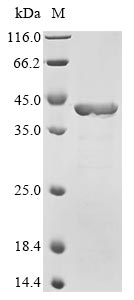Recombinant Escherichia coli RNA polymerase sigma factor rpoS (rpoS) is produced in an E. coli expression system, corresponding to the full-length protein from amino acids 1 to 330. This product is tag-free and shows a purity level of greater than 85%, as verified by SDS-PAGE analysis. Designed for research use only, it appears well-suited for studies requiring high-quality recombinant protein without tag interference.
The sigma factor rpoS serves as a key component of the RNA polymerase holoenzyme in Escherichia coli. It plays what seems to be a crucial role in the transcriptional response to various stress conditions. Its primary function involves regulating genes associated with the stationary phase and stress response, which makes it a significant focus in bacterial gene expression and adaptive mechanisms research.
Potential Applications
Note: The applications listed below are based on what we know about this protein's biological functions, published research, and experience from experts in the field. However, we haven't fully tested all of these applications ourselves yet. We'd recommend running some preliminary tests first to make sure they work for your specific research goals.
Escherichia coli RpoS sigma factor is a bacterial transcription factor that requires precise folding, proper domain organization (with specific regions for core RNA polymerase binding and promoter recognition), and specific tertiary structure for its functional activity in stress response transcription. The E. coli expression system is homologous to this bacterial protein, which significantly increases the probability of correct folding and functionality. The protein is expressed without affinity tags, eliminating potential steric interference with functional domains. While the full-length protein (1-330aa) contains all functional domains, the probability of correct folding with functional sigma factor activity is high, but still requires experimental validation of RNA polymerase binding and promoter recognition capability.
1. In Vitro RNA Polymerase Reconstitution Assays
This application is highly suitable if RNA polymerase binding is validated. RpoS function requires proper folding to form functional holoenzyme complexes with core RNA polymerase. The homologous E. coli expression system strongly supports correct folding. If verified active through binding assays, the protein is excellent for transcription reconstitution studies.
2. Promoter Binding Specificity Studies
This application requires functional validation. Promoter binding requires proper holoenzyme formation with core RNA polymerase, not just the sigma factor alone. If correctly folded and active in holoenzyme assembly (verified), the protein is suitable for promoter specificity studies. If misfolded/unverified, promoter binding data will be biologically meaningless.
3. Protein-Protein Interaction Analysis
This application is well-suited given the homologous expression system and tag-free design. RpoS interactions with regulatory proteins or core RNA polymerase should be replicable if the protein is properly folded. The absence of tags eliminates potential artefacts in interaction studies.
4. Antibody Development and Validation
This application is highly suitable as antibody development relies on antigenic sequence recognition. The full-length, tag-free protein provides authentic epitopes for generating RpoS-specific antibodies. The homologous expression ensures proper folding for conformational epitopes.
5. Structural and Biophysical Characterization
These studies are essential for determining folding status. Techniques should include analytical ultracentrifugation to assess oligomeric state, circular dichroism spectroscopy to evaluate secondary structure, and RNA polymerase binding assays to validate functionality. The tag-free protein is ideal for high-resolution structural studies.
Final Recommendation & Action Plan
The E. coli-expressed, tag-free RpoS has a high probability of correct folding and functionality due to the homologous expression system. Begin with Application 5 (Structural and Biophysical Characterization) to validate folding quality through CD spectroscopy, analytical ultracentrifugation, and most importantly, RNA polymerase core enzyme binding assays. Once holoenzyme formation capability is confirmed, Applications 1 and 2 become highly suitable. Applications 3 and 4 can proceed immediately. The tag-free nature of this protein makes it particularly valuable for structural studies and interaction analyses where tags could cause artefacts.






